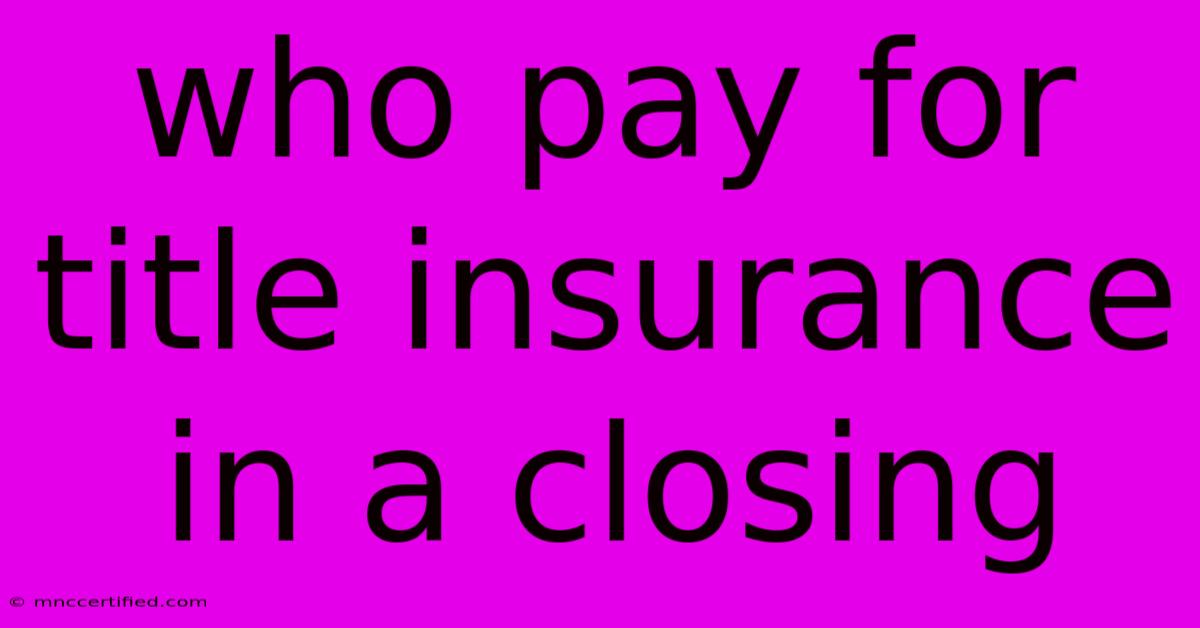Who Pay For Title Insurance In A Closing

Table of Contents
Who Pays for Title Insurance? A Comprehensive Guide for Homebuyers
Buying a home is a major financial investment, and it's crucial to understand every aspect of the process. Title insurance, a crucial element of the closing, can be a source of confusion for many buyers. So, who foots the bill for this important protection? In this comprehensive guide, we'll break down the intricacies of title insurance costs and shed light on who typically pays for it.
Understanding Title Insurance: A Protective Shield for Your Investment
Title insurance is a policy that safeguards your ownership rights in a property. It protects you against financial losses arising from hidden claims or legal issues that may surface after you've purchased the home. These issues can include:
- Forged Documents: A previous owner might have forged documents to falsely claim ownership, leading to a legal challenge to your ownership.
- Unpaid Liens: Unrecorded liens or taxes from previous owners could resurface and threaten your ownership.
- Boundary Disputes: Conflicts over property lines or encroachments could result in costly legal battles.
Who Typically Pays for Title Insurance?
While it may seem intuitive to assume the seller covers the cost of title insurance, the reality is that buyers are generally responsible for purchasing their own title insurance policy.
Here's why:
- Protecting the Buyer's Interests: The buyer's title insurance policy protects them from risks related to the property's ownership. The seller has already owned the property and, in most cases, has already benefited from the protection of a title insurance policy during their ownership.
- Lender's Requirement: Most mortgage lenders require borrowers to purchase title insurance as a condition for obtaining a loan. This ensures that the lender's investment in the property is protected.
The Role of the Seller: A Separate Policy for Peace of Mind
While the buyer typically handles their own title insurance, the seller may also purchase a title insurance policy for the lender. This policy protects the lender against claims that might arise from problems with the seller's ownership history.
However, this is not always a requirement. The terms of the loan and local real estate practices may influence whether the seller needs to obtain this additional policy.
Understanding Costs and Negotiation
Title insurance premiums are typically a one-time fee paid at closing. The cost varies depending on the property's value, location, and the complexity of the title search.
Negotiating the cost: While buyers typically shoulder the burden of title insurance, there's room for negotiation in some cases. In a seller's market, where competition is high, sellers may be willing to cover the cost of the buyer's title insurance policy as an incentive.
Key Takeaways:
- Buyers typically pay for their own title insurance.
- Lenders usually require title insurance as a loan condition.
- Sellers may purchase a separate policy to protect the lender.
- Negotiating the cost of title insurance is possible, particularly in a competitive market.
Understanding who pays for title insurance is crucial to navigating the closing process smoothly. By being informed about these costs and your responsibilities, you can make informed decisions and safeguard your investment in your new home.

Thank you for visiting our website wich cover about Who Pay For Title Insurance In A Closing. We hope the information provided has been useful to you. Feel free to contact us if you have any questions or need further assistance. See you next time and dont miss to bookmark.
Featured Posts
-
Man Utd Wins Van Nistelrooys Future Up In Air
Nov 08, 2024
-
Outer Banks Season 4 Ending Explained Is John B Dead
Nov 08, 2024
-
Shetlands Ashley Jensen Marriage Loss
Nov 08, 2024
-
New Starbucks Holiday Menu Items Launch Nov 7
Nov 08, 2024
-
Chelseas 20 Minute Blitz Goal Highlights
Nov 08, 2024